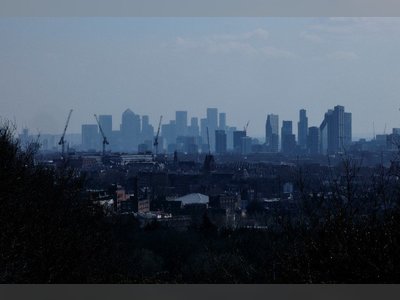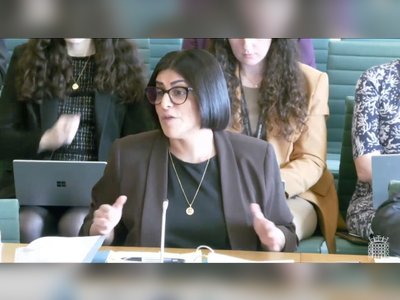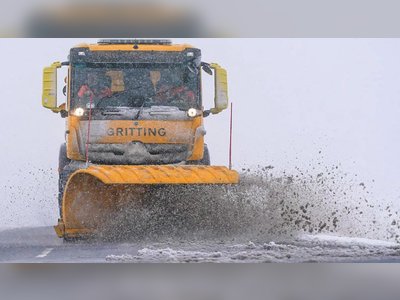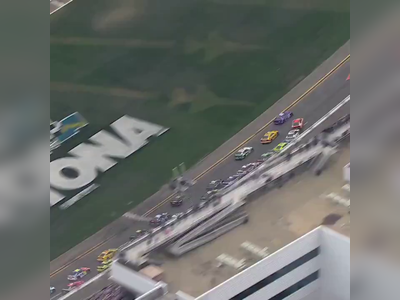
Here’s why Florida got all the emergency medical supplies it requested while other states did not
This disparity has not been lost on the states that feel shortchanged in their requests from the Strategic National Stockpile, a trove of supplies managed by the U.S. Department of Health and Human Services.
Officials fear that hospitals will be overwhelmed by far more patients than they can safely treat if the current pace of infections continues. This month, officials estimated that if the outbreak lasts a year, the U.S. could need 3.5 billion of the N95 masks that protect health care workers. The national stockpile had only 12 million N95 masks and 30 million surgical masks on hand when the crisis began.
While it may appear like the federal government is playing favorites, federal officials said their decisions were based on their best assessment of relative needs. HHS told states this week that it is giving out 25% of the stockpile to states according to population size, and sending another 25% strategically to states with the most severe outbreaks, which can be used for needs such as testing passengers on cruise ships brought back to shore. The remaining 50% will be held in “strategic reserve,” to be used if there’s a huge spike of critical needs around the country.
The inability of the United States to deploy widespread testing for the coronavirus has further complicated how the supplies are being apportioned because health officials do not have a complete picture of where the virus is circulating most widely. But many states, worried that their case counts are about to soar and their hospitals will be swamped, have been unsatisfied with their allotment.
The system appears to roughly conform to states’ populations, rather than the size of their requests. Florida, a state of 21 million, got all 180,000 N95 masks it wanted. Oregon, a state of 4 million, only received 40,000 of the 400,000 masks it requested, and New Jersey, a state of 9 million, got 85,000 of the 2.9 million masks it feels it needs.
It is hard to assess what constitutes a reasonable request. All states are starting with different stockpiles of supplies. Some have been hit harder than others by the virus, and some anticipate they might be. Each state is trying to secure as much as possible for its health workers, who are raising alarms that they are running out of basic supplies.
This pandemic will require enormous amounts of personal protective equipment, or PPE, for health care workers in part because the symptoms of COVID-19 are not unusual — it’s hard to quickly distinguish a COVID-19 patient from someone suffering from the flu. Anyone doctors suspect of being infected with the coronavirus needs to be treated with great care, lest the infection spread. Many items, like gloves and some types of masks, are designed to be used once then thrown away, but some hospitals and long-term care facilities are already experimenting with reusing their equipment to stretch their supplies.
“It’s very frustrating and very scary to hear the numbers,” said Kimberly Green-Yates, chief operating officer of Diakonos Group, which runs about 20 skilled nursing and long-term care facilities across Oklahoma. “The people we take care of are the most vulnerable. Without PPE, we can’t keep them safe.”
Green-Yates said that as soon as her company heard about the deaths in Washington state in a nursing facility, Diakonos ordered a large supply of PPE and locked it away for emergencies. Some of the protective equipment, she said, was used up during this year’s flu season. “If [the virus] gets in, our supply is going to be gone in days,” she explained. “Then what do you do? … We’re working our absolute hardest to keep our elders safe right now. And how are we supposed to do that if we don’t even have equipment?”
A System, Built in the Dark
There is no set formula for how to distribute stockpiled goods in a disaster, but this crisis will place an unprecedented strain on America’s backup supply system.
Most emergencies, like weather-related disasters or chemical plant explosions, are geographically confined and don’t require HHS to make tough decisions about what is most needed where. Through state departments of emergency management, governors request assistance, which can either arrive in the form of “push packages” of ready-to-go aid that can be sent to a state within 12 hours or more customized supplies stored by government warehouses and private companies around the country.
In a statement to ProPublica, HHS acknowledged that the population-based distribution system means that allocations are “likely less than what states are currently requesting,” but noted that “jurisdictions are receiving 100% of their allocations” under the government’s formula. The formula only applies to PPE, and not to ventilators, HHS said.
It’s up to the states to decide what they ask for, and the agency isn’t immune to political pressure. “If a governor jumps up and down and yells and screams, it gets attention,” said Nicole Lurie, former head of the Office of the Assistant Secretary for Preparedness and Response under the Obama administration. “It probably helps to have a really loud megaphone.”
Florida, which has regular experience with hurricanes, isn’t waiting on the sidelines, despite having received its entire wishlist. On Monday, the state’s Division of Emergency Management made a second request, saying that it was still not sufficiently prepared to handle the looming pandemic; it asked for 2 million N95 masks, 500,000 gloves, 500,000 gowns and 250,000 coveralls. The division also asked for thousands of ventilators and hospital beds, as well five mobile intensive care units.
States Are Fighting for Themselves
Several states have voiced their dismay about how the stockpile is being distributed.
“The support we have received from the administration is woefully insufficient,” Rep. Bill Pascrell Jr., D-N.J., told ProPublica. “I wouldn’t call it complete radio silence from federal officials, but their communications are barely flickering. … If our health workers, doctors and nurses especially, don’t have masks, or gloves, or cotton swabs, lives will be lost — full stop.”
Along with 11 other members of Congress from New Jersey, Pascrell co-signed a letter to HHS pushing the agency to send more supplies to their home state. They argued that since the state sits right between New York City and Philadelphia, and people move back and forth from them frequently, New Jersey residents have unique vulnerabilities that HHS has failed to recognize.
New Jersey first requested supplies from the stockpile on Feb. 24, according to a spokeswoman for the state’s Department of Health. Nothing arrived until March 13, more than two weeks later. In addition to the 2.9 million N95 masks, the state requested 864,000 surgical gowns, 864,000 face shields and 2,880,000 pairs of gloves. New Jersey received less than 5% of its request for each of those items, the spokeswoman said.
New York City asked for 2.2 million N95 masks from the stockpile and received only 78,000, according to Health Department spokesman Michael Lanza. All of them were marked as expired. “Public health emergency preparedness, which includes the Strategic National Stockpile, has been chronically underfunded for years,” Lanza said.
In Oklahoma, the state Department of Health sent the Strategic National Stockpile a request on March 11 for supplies including 500,000 N95 masks, 300,000 face shields and 400,000 surgicals gowns. The state began receiving supplies five days later, but it has not gotten 90% of what it wants. “100% of all items were expired,” according to Department of Public Safety spokesperson Cody McDonell, although HHS sent them a letter saying that some of the masks had been performance-tested by the CDC and “they should be just fine to use.”
According to an HHS letter reviewed by ProPublica, most of the stockpile’s personal protective equipment was acquired in 2007 with supplemental funds for pandemic influenza preparedness “and many have exceeded their shelf life.” Even Florida, which got everything it wanted, received expired goods.
In Oregon, a spokesperson for the governor’s office said the state has been told it will receive an additional 15% of its initial order, but that second shipment is yet to arrive. The Oregon Health Authority told its Legislature this week that the state had about 590,000 N95 masks in its stockpile at the start of the outbreak. The supply is down to 421,000. The number of surgical masks has gone from 49,000 to 18,000, and the state has used 83% of the 23,000 gowns it started with.
Nurses say they can’t wait. “Some of our facilities are reporting that they will be out of PPE within the next 48 hours,” said Lynda Pond, president of the Oregon Nurses Association. She said she’s never heard of a hospital being that close to being out of supplies in her 35-year career. What the state has received so far compared to its needs, she said, is “a drop in the bucket.”
The Government Is Panic Shopping
Now, the federal government is scrambling to replenish the stockpile as it runs out. President Donald Trump has said he may use the Defense Production Act, a law that gives him powers to rapidly expand domestic manufacturing of protective masks and clothing, and automakers are trying to figure out if their production lines can be retooled to make medical equipment.
But ramping up won’t be simple, according to Irwin Redlener, a professor and director of the National Center for Disaster Preparedness at Columbia University.
“It’s like panic shopping on the part of government,” Redlener said. “They’ve gone out to every vendor on the planet and every manufacturer to try to get the stockpile built up. But right now every state in the union and many countries are going to the same limited number of vendors. So it’s a real problem.”
The crucial medical devices needed to keep patients alive will likely also be in short supply, Redlener said. He said he understood that the reserve had at least 70,000 ventilators when he served on an advisory committee in 2016. The current total is fewer than 13,000, the National Institutes of Allergies and Infectious Diseases director Dr. Anthony Fauci has said, with a few thousand more at the Department of Defense. Hospitals, which have switched to a just-in-time inventory system that allows them to save money by keeping less equipment in reserve, have about 160,000 ventilators nationwide. Redlener estimates that twice that number may ultimately be needed.
At the moment, states aren’t receiving much in the way of assurances from the federal government. During a press conference on Thursday, Trump said that while domestic manufacturers of face masks have gone into overdrive and the White House is helping, governors need to work to find supplies themselves.
“The government’s not supposed to be out there buying vast amounts of items and then shipping, we’re not a shipping clerk,” Trump said. “As with testing, the governors are supposed to be doing it.”











